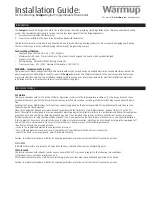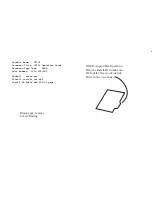
This mode can allow the user to quickly raise the
temperature as required. You can temporarily adjust the
set temperature as follows. (This set temperature will
hold until the next cycle change.)
o
Press and hold
▼
or
▲
to adjust the
set temperature
.
o
Press the
Hold/Return
button to store this setting.
Hold Mode
You can hold the current set temperature
indefinitely. This can be especially useful
when you are on vacation.
o
Press and hold the
Hold/Return
button
on the main display.
Hold
will be
indicated on the display.
o
To cancel this hold, press and hold the
Hold/Return
button again and the indication will disappear from the
display.
Setback Mode
You can use the setback to override the
current set temperature. This is especially
useful if you have an alternative
temperature you repeatedly select when
you are away.
o
Press and hold the
Setback
button. You will be
prompted to enter your setback temperature.
o
Press
Hold/Return
and
Setback
will be indicated on the
display and also a
set-point temperature
. This set-point
will hold until the next scheduled program time.
o
To cancel the setback, press
▼
or
▲
.
o
If a more permanent setback temperature is desired,
press and hold the
Hold/Return
button and
Hold
will
be indicated on the screen as well. To cancel this, you
will need to press and hold the
Hold/Return
button to
cancel the hold and then press
▼
or
▲
to cancel the
setback.
Remote Control Override Mode
If your thermostat was installed with Remote Control
input from a home automation system, this will override
the thermostat when the remote control closes its output
switch or relay.
Setback
and
Hold
will show on the display
and will operate in the setback temperature indefinitely.
To cancel this, the Remote Control switch or relay must
be opened.
Time Control Mode
This mode functions like a timer. The
heating equipment will start and stop
every 15 minutes. You will program a
value between 0 and 15 which indicates
the length of time in minutes the system
will heat out of a possible 15 minutes.
Example: A value of 6 will cause it to heat for 6 minutes of
the 15 minute cycle and not heat for the remaining 9
minutes. 0 would indicate no heating and 15 would
indicate continuous heating.
o
Press and hold the
Options
button.
o
Press
Options
until the
Sens
options screen displays.
o
Press
▼
or
▲
to locate
Regu On
.
o
Press the
Hold/Return
button to select.
o
The screen will now show the heating time (value
between 0 and 15) and current cycle time (repeats
from 0:00 to 14:59 measured in min:sec). Press and
hold
▼
or
▲
to select the
heating time
.
o
Press the
Hold/Return
button to select.
Power Consumption Usage
This thermostat stores the number of
hours it is heating in its memory. This
information may be useful in calculating
the energy used by the floor heating
system.
o
Press and hold the
Options
button.
o
Press
Options
until
Usage
and
1d
show on the display.
o
The time shown on the display is the number of hours
it was heating today.
o
Press and hold
▼
and
▲
to toggle between the
previous 7-day and 30-day usage.
o
Press the
Hold/Return
button to return to normal
operation mode.
Lockout Feature
You have the ability to lock out adjustments by other
users. This may be useful in public locations.
o
Press and hold both
▼
and
▲
at the same time.
Lock
will indicate on the display and all keys are invalid.
o
To cancel the lockout, press and hold both
▼
and
▲
at
the same time again. The
Lock
indication should
disappear.
GFCI Test
There is a GFCI (Ground Fault Circuit
Interrupter) inside this thermostat. It is
designed to help protect from possible
electrical shock if the floor warming
system has been damaged. To make
sure the GFCI is operating properly, test it after the
thermostat has been installed and once each month.
Note: For this function to work properly, the floor system
must be heating.
Heating
will be indicated on the display.
You may need to increase the set temperature
temporarily.
o
Press the
GFCI Test
button on the side of the
thermostat.
GFCI Trip
should be displayed on the
screen and a
right light
will show next to the GFCI Test.
You should also hear a click, indicating power has been
removed from the floor warming system. If any of
these indicators fail, turn off the thermostat and
replace it. Do not continue to use.
o
To reset the GFCI, slide the
On/Standby
switch to
Standby
and then back to
On
. If the GFCI does not
reset, turn the thermostat off. Check the wiring
connections, reset by the
On/Standby
switch, and
check resistances on the floor warming system.
VI.
Specifications
Power Supply
AC120/240V, 50/60Hz
Maximum Load
15A, resistive
Maximum Power 1800W at 120VAC/3600W at 240VAC
GFCI
Class A (5 milliamp trip)
Display Range
32°F -99°F (0°C -37°C)
Setting Range
41°F -99°F (5°C -37°C)
Accuracy
1°F (0.5°C)
Storage Temp.
32°F -120°F (0°C –49°C)
ETL Listing
Control No. 4001076
Programming retained indefinitely.
Current time and day will need to be re-set if power is lost
for more than 10 minutes.
14AWG wire leads attached to the thermostat.
7
8
9





















